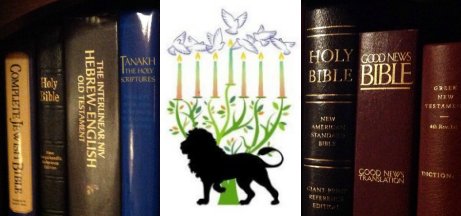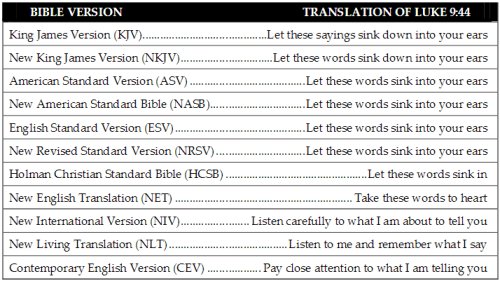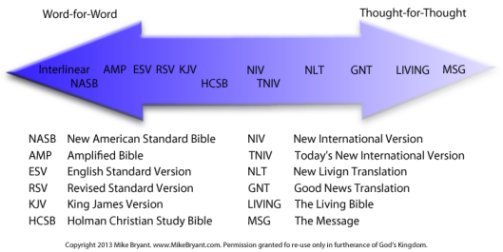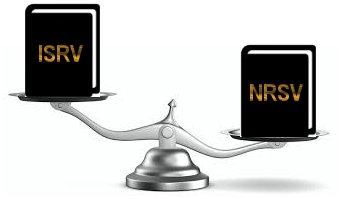
Which version of the Bible should you use? Is there an advantage in using many versions? Is there a best version or even one that may be said to be totally inspired and therefore 100 per cent reliable? These are some of the questions this sub-site seeks to answer as well as explain the reasons Messianic Evangelicals have their preferred translations.
To give you a sample of the way different versions render texts, here is a passage (compiled by James White) translated in several versions:

The first seven are all valid renditions, conveying the Hebrew concept literally. The others try to express the same concept using slightly different words whilst conveying the same meaning. The last four are examples of paraphrases or dynamic equivalent versions (e.g. NIV) which, though more readable for some, can sometimes take liberties with the original meaning. They should probably be called 'commentaries' for in that capacity they can be very helpful. Finding a balance between accuracy and conveyability is one of the tough jobs undertaken by Bible translators.

Bible scholarship is constantly improving translations but unfortunately the market is now flooded with so many new versions that it is hard to review them all. Worse, most of these new versions are not needed but have been published for commercial gain or to circumvent copyright issues. Quite simply, there is a glut of translations with most of them bringing very little new scholarship or manuscript discovery to the public gaze.
The list that follows, which contains Bible versions we have studied, evaluated and used over the last 40 years and so know quite well, is part scholarly and part subjective. There is, alas, no perfect translation, and probably never will be, though we have long sought for one, and even though one widespread cult is insisting there is. The nearest to 'perfection' that one can attain is, of course, to read the Bible in the original Hebrew and Aramaic, and the Greek translation that was in use in apostolic times. Nevertheless nearly all translations are adequate for the salvation message and the best ones contain all the important doctrines (though if you want to understand Paul don't read the NIV!). Ironing out the differences in translations is one reasion this website exists.
It should also be pointed out that some popular versions (like the NIV*) are regularly revised and therefore appear in numerous editions, one of the latest being the less than satisfactory TNIV (Today's NIV). In the majority of cases the most recent editions are the best but this is by no means true of all. Some (like Catholic versions, the NRSV and some versions of the NEB, etc.) contain the Catholic Apocrypha and others (like the post 2nd editions of the messianic RSTNE) contain not only Apocrypha, some of the Pseudepigrapha but a revamped Book of Mormon! So be careful.
*Revisions of the original complete NIV published in 1978 include a minor revision in 1984 and a larger one in 1995, a full revision in 2002, an update in October 2008 for the 30h anniversary of the NIV, another update in 2011 (with the text updated to the 2011 edition of the NIV), and a fully revised update in 2020 named the Fully Revised Edition. NCAY does not recommend the use of editions after 2008 as these are heavily politicised with gender neutrality.
There are also some standard Evangelical translations like the KJV that have been produced with the Hebraic names for messianics. So the choice is potentially vast even if the quality is not uniform.
Another problem is doctrinal commentary footnotes like the infamous Scofield Reference Bible (SRB). Good versions like the KJV can, by association, be ruined by reference editions like this. You'll find the SRB listed in the last section of Bibles never to buy.
Because most of our members and friends cannot afford to purchase dozens of translations, the need for a list which they can intelligently select from has become more accute over the years. This list is not static but is constantly updated. The versions in any one particular section are in no particular order of preference.
We recommend that our readers own at least one Evangelical and one Messianic version out of the 'Excellent Versions' section. Since, understandably, purchasing ability often influences choice many will go for the cheaper mass-produced ones like the messianic Halleluyah Scriptures (a copycat version of the more expensive ISRV) or any number of Evangelical paraphrases. However, paraphrases are not usually reliable when it comes to doctrine even if they may be easier to read. Again, literacy levels will also guide the selection of some for whom we recommend the KNT, NLT or NIRV - these are good versions for young children starting Bible study too.
NCAY tends to use the NKJV in assemblies and even though this does not contain Hebraic names, most members soon become adept at making mental substitutions when reading out aloud - thus 'God' becomes 'Elohim', 'Jesus' becomes 'Yah'shua', 'Law' becomes 'Torah', and so on. We also increasingly use, as a supplement, N.T.Wright's Kingdom New Testament which is by far the best translation for understanding the writings of Paul, Wright being the world's leading Pauline scholar.
Unfortunately there is not, in my view, any Messianic translation comparable in quality to the best of the non-Messianic versions, most of which have strong denominational agendas and are one-man efforts. At this stage it is probably best to own several if you can afford it - the CJB, HRV and AENT are probably the best, though the latter two are only New Testaments (the whole Bible HRV uses a modified Jewish Publication Society Old Testament). One of the problems we find with many messianic versions (e.g. ISRV, RSTNE) is that too many familiar terms (like 'cross', 'righteousness', etc.) tend to be replaced by less familiar and potentially confusing English words (like 'execution stake', 'right-ruling', etc.) which can make for communication problems in evangelism. We like to keep things simple and communicable - the point is not to show off how many Hebrew words you know but to win souls for Messiah and teach the true lifestyle of the saved.
NCAY'S LIST OF FAVOURITE
ENGLISH BIBLE VERSIONS
Last Updated on 10 April 2024

NB. Paraphrase versions should be treated as
commentaries or targums and not as translations!
1. Excellent Versions - Most Used in NCAY
New King James Version (NKJV) Evangelical Version
New Revised Standard Version (NRSV) Evangelical Version
English Standard Version (ESV) Evangelical Version
New English Translation (NET) Evangelical Version
New English Translation of the Septuagint (NETS) Evangelical/Orthodox Version
Kingdom New Testament (N.T.Wright) (KNT) Evangelical Version
New Testament for Everyone (N.T.Wright) (NTFE) Evangelical Version
Hebraic-Roots Version (Trimm) (NT/Bible) (HRV) Messianic Version
Aramaic English New Testament (Roth) (AENT) Messianic Version with Aramaic text
The Original Aramaic New Testament in Plain English (Glenn Bauscher)
Various On-Line Peshitta New Testaments Aramaic text
Young's Literal Translation (YLT)* Evangelical Version
Concordant Literal New Testament (CLNT)* Greek text
Concordant Version of the Old Testament (CVOT)* Hebrew text
Benjamin Wilson's Emphatic Diaglott - New Testament (WED)* Greek text
Weymouth New Testament - original version (WNT)* Evangelical
"The ESV is the NASB without semi-colons"
2. Very Good Versions - Commonly Used in NCAY
Authorised King James Version (1611) (AV, KJV) Evangelical Version
Legacy Standard Bible (LSB) Evangelical Version
New American Standard Bible (NASB) Evangelical Version
New International Version (1984) (NIV) Evangelical Version
Amplified Version (AmpV) Evangelical Version
Orthodox Jewish Bible (Goble) (OJB) Messianic Version
Complete Jewish Bible (Stern) (CJB) Messianic Version
Institute for Scripture Research Version (Koster) (ISRV) Messianic Version
Aleph-Tav Old Testament (Ricther) (ATOT) Messianic Version
Complete Messianic Aleph-Tav Scriptures (Sanford) (CMATS) Messianic Version
3. Good Versions - Infrequently Used in NCAY
New English Bible (NEB) Evangelical Version
American Standard Version (ASV) Evangelical Version
Revised Standard Version (RSV) Evangelical Version
Word English Bible (WEB) Evangelical Version
Revised Version (RV) Evangelical Version
Moffatt Bible (Moff.) Evangelical Version
Berkley Version (BV) Evangelical Version
Smith & Goodspeed Version (S&GV) Evangelical Version
J.B.Philips Version (JBP) Evangelical Version
Coverdale Bible (Cov) Evangelical Version
Geneva Bible (Gen) Evangelical Version
Holman Christian Standard Bible (HCSB) Evangelical Version
New Living Translation {paraphrase} (NLT) Evangelical Version
Living Bible {paraphrase} (LB) Evangelical Version
Good News Bible {paraphrase} (GNB) Evangelical Version
New International Readers Version {paraphrase} (NIRV) Evangelical Version
Contemporary English Version {paraphrase} (CEV) Evangelical Version
Restoration Scriptures True Name Edition - 2nd edn. (RSTNE) Messianic Version
Halleluyah Scriptures (Koster imitation) (HS) Messianic Version
Messianic Renewed Covenant New Testament (MRC-NT) Messianic Version
Kata Mattyah (Mt) True Name Version (Snyder) (KM-TNV) Messianic Version
Jerusalem Bible - 1st edition (JB) Catholic Version
New American Bible - Revised Edition (RNAB) Catholic Version
4. Some Bad Versions - Never Used in NCAY
Inspired Version/Joseph Smith Translationi (IV/JNT) Mormon Version
New World Translationii (NWT) Jehovah's Witness Version
Douay Version (Dou) Catholic Version
Scofield Reference Bibleiii (Sco) Evangelical Version
J.N.Darby, A New Translation (Darby) Evangelical Version
Clear Word Bible {paraphrase} (CWB) Seventh Day Adventist Version
The Message {paraphrase}iv (ThM) Evangelical Version
Lolcats {paraphrase} (LoCa) Evangelical Version
The Word on the Street {paraphrase} (WoS) Evangelical Version
Pidgin English {paraphrase} (PE) Evangelical Version
New Spirit-Filled Bible by Jack Hayford {paraphrase} (NSFB) Evangelical Version
Hope for Today Bible by Joel Osteen {paraphrase} (HFTB) Evangelical Version
The Cotton Patch Bible {paraphrase} (CPB) Evangelical Version
The Voice Bible {paraphrase} (TVB) Evangelical Version
Common English Bible {paraphrase} (CEB) Evangelical Version
Mirror Bible by Francois du Toit {paraphrase} 'New Agey' Version
The Passion Translation {paraphrase} 'Pentecostal' Version
i. The IV is a product of the Reorganized Church of Jesus Christ of Latter Day Saints (now called the Community of Christ), a denomination of the Mormon Church, but is not strictly-speaking a "translation" as no Hebrew or Greek manuscripts were used -- it is an alleged correction of the KJV by Joseph Smith using "inspiration" only and is unreliable. It is also used by the main body of the Mormon (LDS) Church where it is known as the 'Joseph Smith Translation' (JST)
ii. The NWT is a product of the Watchtower Bible & Tract Organisation and is not a translation either. It is a doctored Bible designed especially to reflect Jehovah's Witness dogma and is unreliable. This is probably the most mutilated Bible "version" on the market and should be avoided completely, although the latest (2013) Revised edition is a marked improvement on the first.
iii. Our problem with this Bible (which is the King James) is not the translation but the numerous footnotes containing heretical, unbiblical teachings and has done more to damage Evangelical Christianity than perhaps any other published Bible.
iv. Probably one of the worst translations on the market, an 'ultra-paraphrase' or (better still) 'mutilation'. As one commentator put it, what the Bible would look like if God were Eugene Peterson.
Examples of some dreadful translations from modern paraphrase versions:
"This is how much God loved the world: He gave his Son, his one and only Son. And this is why: so that no one need be destroyed; by believing in him, anyone can have a whole and lasting life" (John 3:16, The Message).
"Nor do people put new tubes in old, bald tires. If they do the tires will blow out, and the tubes will be ruined and the tires will be torn up. But they put new tubes in new tires and both give good mileage" (Matthew 9:17, Cotton Patch Bible).
"After they had checked out, the Lord's messenger made connection with Joseph in a dream and said, "Get moving, and take your wife and baby and highball it to Mexico" (Matthew 2:13, Cotton Patch Bible).
"Before time itself was measured, the Voice was speaking. The Voice was and is God. . . . The Voice took on flesh and became human and chose to live alongside us. We have seen Him, enveloped in undeniable splendor-the one true Son of the Father-evidenced in the perfect balance of grace and truth" (John 1:1,14, The Voice Bible).
"After the fire, there was a sound. Thin. Quiet" (1 Kings 19:12, Common English Bible).
"Mankind is in the same boat; their distorted behavior is proof of a 'lost' blueprint" (Rom.3:23, Mirror Bible).
KJV-Onlyism - A recent review and the complete website
If you would like us to consider other versions not mentioned on this list, please contact us with any website reviews which you think might be helpful.
We do not review 'messianised' Protestant versions like The Sacred Scriptures (Bethel Edition) which is simply the old American Standard Version (ASV) which have 'Yahweh', 'Yahshua' and 'Elohim' substituted in. There are a number of cosmetic versions like this, such as The Word of Yahweh (Eaton Rapid, MI) which is basically a messianised KJV. None of these, in our view, add anying of value to our knowledge of the Scriptures and contain all the old errors of the Hebrew Masoretic and Greek texts.
Non-English translations (e.g. German, Norwegian, Swedish, Afrikaans, etc.) are examined elsewhere on this website.

"No translation from one language to another can ever be exact. Exact translation is as impossible as a square circle" (Dr.W.E.Sangster)
""Versions, or translations, are not inspired. If they were, all of them would be just alike. But the original manuscript was inspired" (B.H.Carroll)
"Variety of translations is profitable for finding out of the sense of the scriptures" (King James Version 1611 Translation Committee)
|


